-

Whose History Counts
0R295,00Originally planned as a fact-based book on the pre-colonial history of the Eastern Cape in the true tradition of history, this ground-breaking book focuses on epistemological and foundational questions about the writing of history and whose history counts. Whose History Counts challenges the very concept of pre-colonial and explores methodologies on researching and writing history.
The reason for this dramatic change of focus is attributed in the introduction of the book to the student-led rebellion that erupted following the #RhodesMustFall campaign which started at the University of Cape Town on 9 March 2015. Key to the rebellion was the students? opposition to what they dubbed colonial education and a clamour for, among others, a ?decolonised curriculum?. This book is a direct response to this clarion call.eBook: View eBook Version
-

Whose History Counts
0R235,00Originally planned as a fact-based book on the pre-colonial history of the Eastern Cape in the true tradition of history, this ground-breaking book focuses on epistemological and foundational questions about the writing of history and whose history counts. Whose History Counts challenges the very concept of pre-colonial and explores methodologies on researching and writing history.
Print: View Print Version
-

-
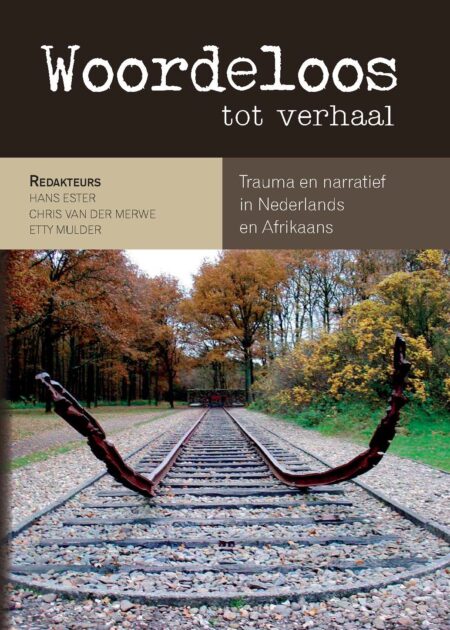
Woordeloos tot Verhaal
0R440,00Trauma behels in Woordeloos tot verhaal die oorweldigende effekte van geweld op die indiwidu sowel as die kollektiewe verlies van betekenis by die ineenstorting van ‘n bekende wereld. Die artikels fokus egter nie alleen op die duister kant van die menslike natuur en van die menslike geskiedenis nie, maar verken ook die helende kragte wat die verwerking van trauma moontlik maak. Van wesentlike belang in dia verband is die skeppende krag van die menslike gees wat die woordloosheid as gevolg van ‘n oorweldigende trauma kan transformeer tot betekenisgewende verhaal. Woordeloos tot verhaal is in menig opzicht een baanbrekend werk. Het brengt 24 onderzoekers uit verschillende disciplines bij elkaar om vanuit een scala van perspectieven helderheid te verschaffen over het trauma als centraal gegeven in de menselijke samenleving. Nieuw is tevens de samenwerking tussen Afrikaanstalige en Nederlandstalige auteurs. Zij hebben elkaar gevonden vanuit een gemeenschappelijke belangstelling en werden gestimuleerd door de verwantschap tussen hun talen.
-
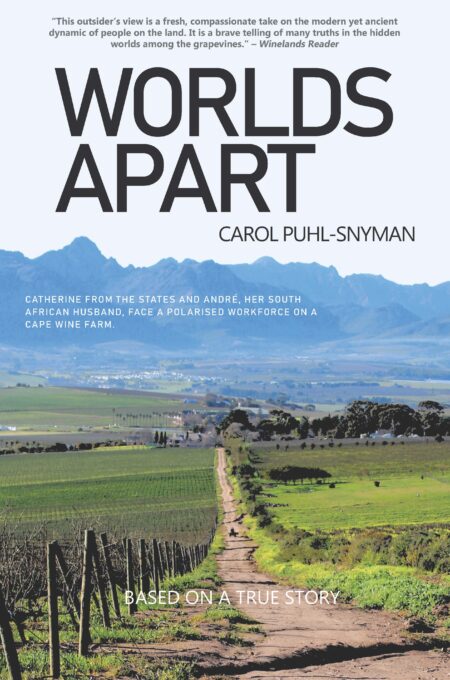
Worlds Apart
0R280,00Catherine from America and South African Andr have a small grape-producing farm in the Cape Winelands, but their dream is becoming a nightmare. A great gap has opened up between them and the resident workers, revealing vastly different perspectives. The situation threatens the relationship between Catherine and Andr, compromises CatherineOs best efforts to improve farmworker life, and endangers them all. Inspired by actual events, Worlds Apart explores what can happen in a changing post-apartheid context when diverse people on one farm are forced to face off against one another.
eBook: View eBook Version
-

Worlds Apart
0R225,00Dr Carol Puhl-Snyman fell in love with the people of South Africa and with the countryOs potential when she first arrived in 1985 on a South African-American lecturing exchange in Applied Linguistics. During that trip she met the man who would become her husband and she left America for him. They managed to buy a small wine farm in Stellenbosch, the setting for this novel. In her academic career she has taught communication and language-related courses, mostly at tertiary level, and has authored several academic articles. This is her first novel.
Print: View Print Version
-
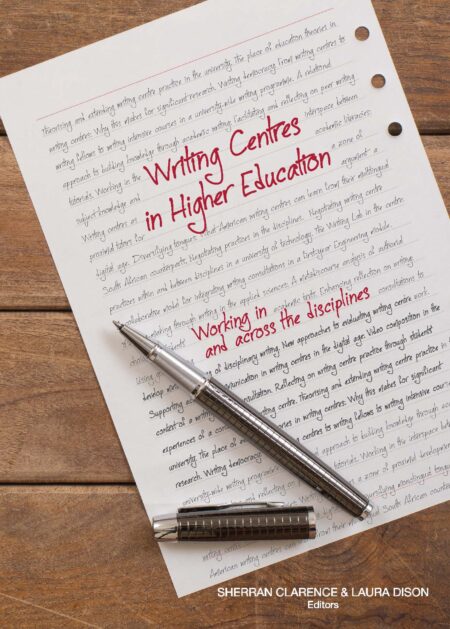
Writing Centres in Higher Education
0R365,00Writing Centres in South Africa, and globally, are now well established academic support centres within many universities. Historically tasked with supporting students as they grapple with the demands of academic writing, many centres are now moving beyond their own walls to work with academic tutors, lecturers and departments to rethink the ways in which knowledge is transformed into different kinds of disciplinary writing. This move raises pertinent questions for writing centre directors, tutors/consultants, and for the universities that house them: how does a centre, tasked with supporting more general academic literacy development through writing pedagogies, initiate students into a range of particularised discourse communities?
How do writing centre staff and disciplinary lecturers negotiate their shared, and separate, concerns for student learning through collaborative writing development projects? How do writing centres work with assignments and forms of literacy that challenge them to reconfigure their own pedagogical practices and expand their conceptions of writing support?
How do writing centres maintain their core focus as they move flexibly beyond their own spaces to understand the nature of disciplinary writing?
This collection of essays reflects on the ways in which writing centres in South Africa are working in and across disciplines. Institutional constraints and challenges that arise from these collaborations are addressed and opportunities for transforming teaching and learning spaces are explored. The chapters speak to the global move in higher education to reconsider how knowledge is made, who makes it, and how support and development opportunities for students and lecturers should be created and sustained across the disciplines. This volume contributes to the body of knowledge in the growing field of the scholarship of teaching and learning in higher education in South Africa. It builds on the work of the first collection of such essays: Changing Spaces: Writing Centres and Access to Higher Education (Eds. A. Archer and R. Richards, 2011, SUN PReSS) to understand why working within the disciplines is so critical for writing development in a South Africancontext.
eBook: View eBook Version
-
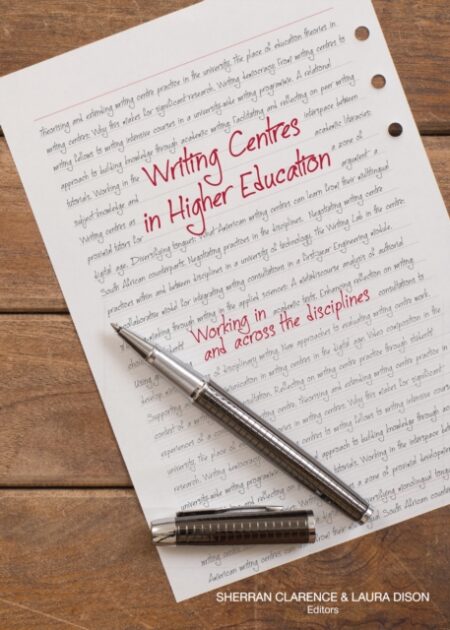
Writing Centres in Higher Education
0R0,00This collection of essays reflects on the ways in which writing centres in South Africa are working in and across disciplines. Institutional constraints and challenges that arise from these collaborations are addressed and opportunities for transforming teaching and learning spaces are explored. The chapters speak to the global move in higher education to reconsider how knowledge is made, who makes it, and how support and development opportunities for students and lecturers should be created and sustained across the disciplines. This volume contributes to the body of knowledge in the growing field of the scholarship of teaching and learning in higher education in South Africa. It builds on the work of the first collection of such essays: Changing Spaces: Writing Centres and Access to Higher Education (Eds. A Archer and R Richards, 2011, SUN PReSS) to understand why working within the disciplines is so critical for writing development in a South African context.
Print: View Print Version
-
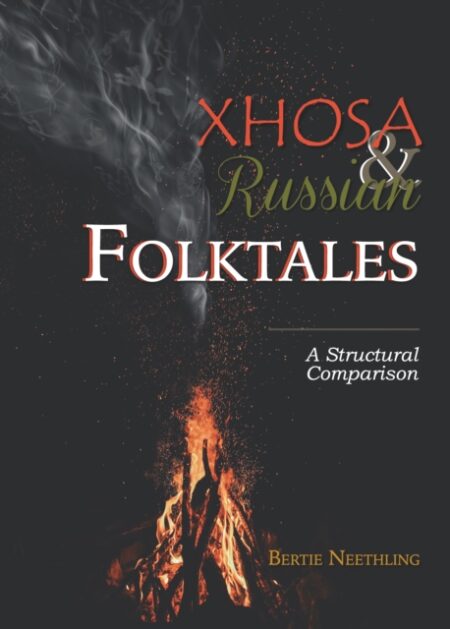
Xhosa and Russian Folktales
0R200,00The purpose of this publication is to indicate that Xhosa iintsomi (folktales) are structured in such a way that many links or commonalities emerge when a comparison between tales is made. Orally transmitted literary forms had to endure much prejudice and were often not considered worthy of study. However, in many different cultures all over the world, the concept of oral literature and its functioning still exists. There are various forms of oral literature, but one of the best known is the folktale. Folklorist and formalist, Vladimir Propp (1895-1970), aimed to describe the story structure of Russian folktales according to a linear sequence of the acts of the characters. Using one hundred folktales, he illustrated how the storylines of these tales are remarkably similar – identical actions are often performed, only by different characters. The somewhat surprising and obvious links between Propp’s material and Xhosa iintsomi prompted the choice of Propp’s model as the departure point for this comparative study. Forty’five Xhosa folktales were chosen because of their literary quality and suitability to Propp’s methodology as a tool to organise the Xhosa data on the grounds of structural features that characterise this genre.
Print: View Print Version
-

Xhosa and Russian Folktales
0R250,00The purpose of this publication is to indicate that Xhosa iintsomi (folktales) are structured in such a way that many links or commonalities emerge when a comparison between tales is made. Orally transmitted literary forms had to endure much prejudice and were often not considered worthy of study. However, in many different cultures all over the world, the concept of oral literature and its functioning still exists. There are various forms of oral literature, but one of the best known is the folktale. Folklorist and formalist, Vladimir Propp (1895?1970), aimed to describe the story structure of Russian folktales according to a linear sequence of the acts of the characters. Using one hundred folktales, he illustrated how the storylines of these tales are remarkably similar ? identical actions are often performed, only by different characters. The somewhat surprising and obvious links between Propp’s material and Xhosa iintsomi prompted the choice of Propp’s model as the departure point for this comparative study. Forty?five Xhosa folktales were chosen because of their literary quality and suitability to Propp’s methodology as a tool to organise the Xhosa data on the grounds of structural features that characterise this genre.
eBook: View eBook Version


